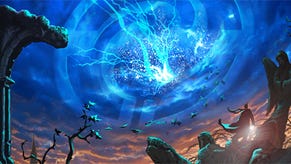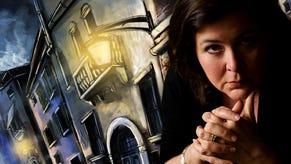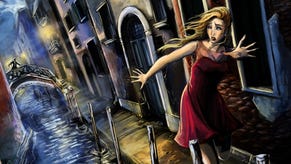Hands On: Jane Jensen's Moebius
Sins Of The Forefathers
As RPS drop-out Kieron tweeted the other day, "We are the generation who funded more point and click adventures, and we'll get what we deserve." He was expressing frustration at the woeful lack of funding for Satellite Reign (FUND IT!), while seemingly so many adventures are seeing that green, green light. But what of those adventures? For all of last year's fuss, little has appeared so far - has it been money well spent? Should the Gillens of the world be quieted by the adventure devotees and their wallets? Well, it's a pleasure to report that from my time with Jane Jensen's Moebius, in at least one case the answer could well be: yes.
It took me a while to put my finger on what it was that felt different about playing the first couple of chapters of Moebius. The premise is completely daft - an antiques über-expert gets hired by a mysterious man to assess whether a murder victim shares a significant amount in common with any famous person from the last couple of thousand years. The presentation is traditional - fixed backgrounds around which awkwardly animated characters trot, looking at and picking up items for infinite pockets. The voice acting is pleasurably hammy, exaggerated caricatures barking information at each other. Puzzles involve picking up everything and putting it all down in the right places, alongside the game's own unique observation skills that we'll get to. So what is it? What about all the traditional point-n-click elements being exactly where you'd expect them to be makes this feel different from its peers?
It's good!
It was this that was eluding me. I love adventure games, and as such, I'll put up with an awful lot. It's testament to how bad so many are that I still find myself mostly complaining in most reviews. It was peculiar to be experiencing all the silly tropes of the genre, but realising I wasn't fighting against it to have a good time. It was just letting me.
The ludicrously named Malachi Rector is a genius. His photographic memory, combined with an all-encompassing knowledge of seemingly all of history, makes him expert in both antiques and antiquity, and also an arrogant sod. When the utterly ridiculously named secret government agency F.I.S.T. (Future Intelligence Science & Technology) hires him, it's time to hot-foot it around the world, analysing things with this analysing brain.
So yes, it's preposterous. He is to history what Gabriel Knight was to ghoulies, although a distinctly less convivial fellow. Rude to just about everyone, he has that arrogance that seemed to work for House, The Mentalist, and the like. But rather than creating that awkward feeling of being forced to control a character you'd rather not be, as plagues so many contemporary adventures, it's great fun to be Rector. He's properly smart, rather than just a douchebag.
Rector's skills include an ability to scan people before speaking to them, picking up aspects of their character from his observations, that then play in the conversations you have. It's a bit Sherlock Holmes, as you make wildly spurious assumptions about a person based on some grub on their collar, the shape of their eyebrows, or whatever, and are of course exactly correct because the writers wrote it that way. Don't look for those things, by the way, and the conversations go differently.
He can also more deeply analyse a particular subject, comparing them to the litany of historical figures he stores in his head. So in that first couple of chapters I was off to Venice, hired to learn what I could about a murdered woman, found hanged from a bridge. As I spoke to relatives, explored her house, and generally snooped, I gathered a bunch of facts about her. That she was married at 19, to a man in his 40s. That she was pregnant a year into the marriage. That she was considered one of the most beautiful women in the area. And so on. And then compared these facts to a dozen or so historical women who shared similar properties. In a sort of lifestyle version of Guess Who, you eliminate potential matches until you've got it down to just a few possibilities. Is she most like Cleopatra, Livia Drusilla, Countess Marie Walewska, or Gorgo of Sparta? And why is her being like someone from the past a thing anyway? The early section of the game doesn't explain, but put together with the title, I have my suspicions.
The second section of this early preview build took me to Cairo, and offered a slightly different experience. It was less focused on a tight investigation, and more open, more like a regular adventure. Exploring locations, meeting various dubious characters, winning a game of darts, and trying to figure out who a mysterious blond man might be, were all on my journey to meet a man about a statue. Again, while the puzzles were absolutely contrived, and the circumstances daft, it was the right sort of contrived and daft, and delivered with a deft hand that reminds why Jensen has such a huge reputation (if you pretend Gabriel Knight 3 didn't happen).
A lot of work needs to be done to smooth things out, removing odd pauses that break the flow, but then this is early alpha code and shouldn't be representative of the final game at all. And dear God, they have to do something about the character model's shoulders. However, one feature which I suspect is in there for debugging would be amazing if it could remain - double clicking moves Rector instantly to that spot on the screen, which does nothing for realism, but everything for speeding up that laborious adventuring trudge of having to walk up to everything you look at. Pinkerton Road - leave it in!
What I've played is far too little to give an impression on whether the story and concept will hold up. It's only hinted at it so far, despite lasting a couple of hours, and that bodes well for a nicely crafted arc. It remains to be seen if it can hold itself together, although early impressions suggest it should.
What's also interestingly hinted at is a possible relationship between Rector and another man in the game. If that is seen through, then not only would it be a massive step forward in terms of having a gay lead in a videogame, but also adds all manner of potential narrative intrigue bearing in mind who he might be. Again, supposition at this point.
It's a very gratifying experience to play the first of these big-name Kickstarter adventures, and rather than just have a nostalgic experience, be reminded why it was their games were such big deals in the 1990s. Moebius could still unwind into meandering gibberish - there's clearly the potential for that bearing in mind the metaphysical implications of what it hints at here. But it could just as easily be a really worthwhile adventure game, with no pretentions to be anything else. And that's what rather a lot of us have been craving.











